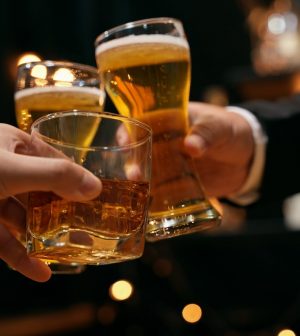- Could Your Grocery Store Meat Be Causing Recurring UTIs?
- Are You Making This Expensive Thermostat Error This Winter?
- Recognizing the Signs of Hypothyroidism
- 10 Strategies to Overcome Insomnia
- Could Artificial Sweeteners Be Aging the Brain Faster?
- Techniques for Soothing Your Nervous System
- Does the Water in Your House Smell Funny? Here’s Why
- Can a Daily Dose of Apple Cider Vinegar Actually Aid Weight Loss?
- 6 Health Beverages That Can Actually Spike Your Blood Sugar
- Treatment Options for Social Anxiety Disorder
A Boozy Night Out Could Upset Your Heart’s Rhythm

Binge drinking at a party or club could feel great when the music’s beating, but it’s your heart beat that might pay the price.
Researchers in Germany found that 1 in every 20 young Munich revelers developed “clinically relevant arrhythmias” as they got drunk and then recovered from a hard night’s drinking.
“Our study furnishes, from a cardiological perspective, another negative effect of acute excessive alcohol consumption on health,” said study lead author Stefan Brunner. He’s with the department of cardiology at Ludwig-Maximilians-University (LMU) Hospital in Munich.
He and co-author Dr. Moritz Sinner, also of LMU University Hospital, had previously studied alcohol’s effect on heart rhythms during Munich’s famed OktoberFest in 2015. At that time, they only had a one-time electrocardiogram (ECG) “snapshot” to base their findings on.
This time, the two experts used mobile equipment to track 48 hours’ worth of changes in heart rhythms in more than 200 young partygoers before, during and after a night of heavy drinking.
They tracked people headed to parties where high intoxication was likely. They compared ECG results for before (hour 0) during (hours 1 to 5) and after (hours 6 through 19) the parties.
“Despite the festive mood of the study participants, the quality of the ECGs was almost universally high throughout,” the researchers noted.
The main result: “Clinically relevant arrhythmias were detected in over five percent of otherwise healthy participants,” Moritz Sinner said.
He noted that these aberrations in heart beat largely occurred in the hours after the drinking bout had ended.
The study confirms alcohol’s toxic ability to upset heart rhythms, the researchers said.
Even when participants were actively partying, “alcohol intake during the drinking period led to an increasingly rapid pulse of over 100 beats per minute,” the team noted.
As to the longer-term effects of excessive drinking on the heart rhythm, that may be elucidated in future research, the investigators said.
The findings were published Oct. 4 in the European Heart Journal.
More information
Find out more about drinking effects on heart health at the American Heart Association.
SOURCE: Ludwig-Maximilians-University Munich, news release, Oct. 9, 2024
Source: HealthDay
Copyright © 2026 HealthDay. All rights reserved.










